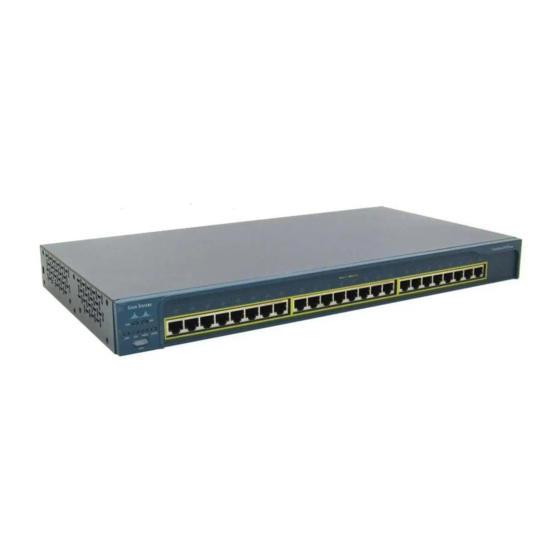Cisco Catalyst 2950SX-24 Fiche technique - Page 6
Parcourez en ligne ou téléchargez le pdf Fiche technique pour {nom_de_la_catégorie} Cisco Catalyst 2950SX-24. Cisco Catalyst 2950SX-24 15 pages. Catalyst 2950 series switches
Également pour Cisco Catalyst 2950SX-24 : Bulletin d'information sur les produits (3 pages), Bulletin d'information sur les produits (5 pages), Manuel de migration (25 pages)

Product Features and Benefits
Feature
Availability
Superior redundancy
for fault backup
Integrated Cisco IOS
Software features
for bandwidth
optimization
All contents are Copyright © 1992–2003 Cisco Systems, Inc. All rights reserved. Important Notices and Privacy Statement.
Benefit
• IEEE 802.1D Spanning Tree Protocol support for redundant backbone connections and
loop-free networks simplifies network configuration and improves fault tolerance.
• Support for Cisco Spanning Tree Protocol enhancements such as UplinkFast,
BackboneFast, and PortFast technologies ensures quick failover recovery and enhances
overall network stability and availability.
• Support for an optional 675W redundant Cisco AC power system provides a backup
power source for as many as four units or six units, respectively, for improved fault
tolerance and network uptime.
• Unidirectional link detection (UDLD) and aggressive UDLD detect and disable
unidirectional links on fiber-optic interfaces caused by incorrect fiber-optic wiring or
port faults.
• Bandwidth aggregation through Cisco EtherChannel technology enhances fault tolerance
and offers higher-speed aggregated bandwidth between switches to routers and
individual servers. Port Aggregation Protocol (PagP) is available to simplify configuration.
• VLAN1 minimization allows VLAN1 to be disabled on any individual VLAN trunk link.
• Per-port broadcast, multicast, and unicast storm control prevents faulty end stations from
degrading overall system performance.
• Per VLAN Spanning Tree Plus (PVST+) allows for Layer 2 load sharing on redundant links
to efficiently use the extra capacity inherent in a redundant design.
• VLAN Trunking Protocol (VTP) pruning limits bandwidth consumption on VTP trunks by
flooding broadcast traffic only on trunk links required to reach the destination devices.
Dynamic Trunking Protocol (DTP) enables dynamic trunk configuration across all ports in
the switch.
• IGMPv3 snooping provides for fast client joins and leaves of multicast streams and limits
bandwidth-intensive video traffic to the requestors. MVR, IGMP filtering, and fast-join and
immediate leave are available as enhancements.
Cisco Systems, Inc.
Page 6 of 15
